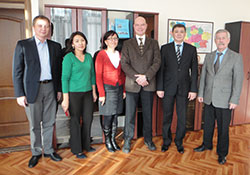Kazakhstan national measles and rubella reference laboratory assessed by WHO expert

WHO
The WHO European Region has adopted a goal to eliminate measles and rubella by 2015. High vaccination coverage, low incidence and strong surveillance are critical components to achieving this goal. Laboratory testing is the only way to confirm a clinical case of measles or rubella, as other pathogens may cause similar clinical symptoms. Therefore, all suspect clinical cases need to be investigated by a proficient laboratory to ensure no virus is circulating. WHO coordinates a laboratory network of national reference laboratories for measles and rubella and nearly all Member States of the region have a designated reference laboratory. WHO/Europe's coordination activities predominantly focus on ensuring high laboratory-based surveillance, but also on providing training opportunities, a forum to discuss laboratory issues and development, as well as sharing standard operating procedures.
A global external quality assurance programme has been implemented since 2001. An annual accreditation review of all the network laboratories is conducted annually. On-site visits by a WHO laboratory specialist are part of this review. On 28 to 30 November 2011, Dr Mick Mulders from WHO/Europe's Vaccine-preventable Diseases and Immunization programme conducted such an on-site accreditation review, with support from the WHO Country Office, of the national measles and rubella reference laboratory of Kazakhstan at the Scientific and Practical Centre for Sanitary Epidemiological Expertise and Monitoring located in Almaty. The laboratory, which falls under the supervision of the Ministry of Health of Kazakhstan, Committee for Sanitary-Epidemiological Surveillance, has excellent facilities and a well-trained staff. The outcome of the on-site review will be shared with the laboratory when data analysis is completed.



